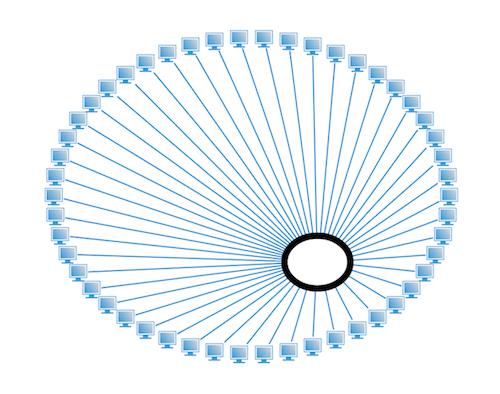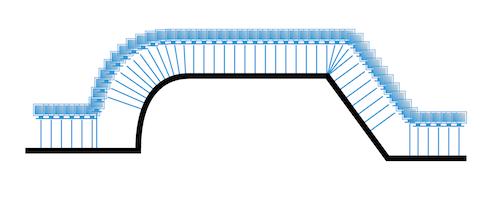电信网络拓扑图自动布局之曲线布局
Posted xhload3d
tags:
篇首语:本文由小常识网(cha138.com)小编为大家整理,主要介绍了电信网络拓扑图自动布局之曲线布局相关的知识,希望对你有一定的参考价值。
在前面《电信网络拓扑图自动布局之总线》一文中,我们重点介绍了自定义 EdgeType 的使用,概括了实现总线效果的设计思路,那么今天话题是基于 HT for Web 的曲线布局(ShapeLayout)。
ShapeLayout 从字面上的意思理解,就是根据曲线路径来布局节点,省去手动布局节点的繁琐操作,还能保证平滑整齐地排布,这是手动调整很难做到的。ShapeLayout 结合前面提到的总线,是最普遍的应用。

http://www.hightopo.com/demo/EdgeType/ShapeLayout-Oval.html
我们先来看看最简单的圆和椭圆是如何实现自动布局的。我们知道在几何学中,圆和椭圆是可以用三角函数老表示,那么我们就可以将圆或者椭圆分成若干份,通过三角函数就可以算出圆或椭圆上的一点,将节点放到计算出来的点的位置,这样就可以达到自动布局的效果。具体的核心代码如下:
var radians = Math.PI * 2 / nodeCount, w = width / 2, h = height / 2, a = Math.max(w, h), b = Math.min(w, h), x, y, rad, node; if (shape === \'circle\') a = b = Math.min(a, b); for (var i = 0; i < nodeCount; i++) { rad = radians * i; x = a * Math.cos(rad) + position.x + offset.x; y = b * Math.sin(rad) + position.y + offset.y; node = this._nodes[i]; if (!node) continue; if (!anim) node.setPosition({ x: x, y: y }); else { anim.action = function(pBegin, pEnd, v) { this.setPosition({ x: pBegin.x + (pEnd.x - pBegin.x) * v, y: pBegin.y + (pEnd.y - pBegin.y) * v }); }.bind(node, node.getPosition(), { x: x, y: y }); ht.Default.startAnim(anim); } }
当然,会有人会问,对椭圆按照角度平均分成若干份计算出来的位置并不是等距的,没错,确实不是等距的,这这边就简单处理了,如果要弧度等距的话,那这个就真麻烦了,在这边就不做阐述了,也没办法阐述,因为我也不懂。

http://www.hightopo.com/demo/EdgeType/ShapeLayout.html
如上图的例子,节点沿着某条曲线均匀布局,那么这种不是特殊形状的连线组合是怎么实现自动布局的呢?其实也很简单,在前面总线章节中就有提到,将曲线分割若干小线段,每次计算固定长度,当判断落点在某条线段上的时候,就可以将问题转换为求线段上一点的数学问题,和总线一样,曲线的切割精度需要用户来定义,在不同的应用场景中,需求可能不太一样。
preP = beginP; var nodeIndex = 0, indexLength, node; for (; i < pointsCount;) { p = this._calculationPoints[i]; indexLength = padding + resolution * nodeIndex; if (p.totalLength < indexLength) { preP = p; i++; continue; } node = this._nodes[nodeIndex++]; if (!node) break; dis = indexLength - preP.totalLength; tP = getPointWithLength(dis, preP.point, p.point); p = { x: tP.x + position.x + offset.x - width / 2, y: tP.y + position.y + offset.y - height / 2 }; if (!anim) node.setPosition(p); else { anim.action = function(pBegin, pEnd, v) { this.setPosition({ x: pBegin.x + (pEnd.x - pBegin.x) * v, y: pBegin.y + (pEnd.y - pBegin.y) * v }); }.bind(node, node.getPosition(), p); ht.Default.startAnim(anim); } preP = { point: tP, distance: dis, totalLength: indexLength }; }
以上就是非特殊形状的连线组合的核心代码,这也只是代码片段,可能理解起来还是会比较吃力的,那么下面我将贴上源代码,有兴趣的朋友可以帮忙瞅瞅,有什么不妥的,欢迎指出。
;(function(window, ht) { var distance = function(p1, p2) { var dx = p2.x - p1.x, dy = p2.y - p1.y; return Math.sqrt(Math.pow(dx, 2) + Math.pow(dy, 2)); }; var bezier2 = function(t, p0, p1, p2) { var t1 = 1 - t; return t1*t1*p0 + 2*t*t1*p1 + t*t*p2; }; var bezier3 = function(t, p0, p1, p2, p3 ) { var t1 = 1 - t; return t1*t1*t1*p0 + 3*t1*t1*t*p1 + 3*t1*t*t*p2 + t*t*t*p3; }; var getPointWithLength = function(length, p1, p2) { var dis = distance(p1, p2), temp = length / dis, dx = p2.x - p1.x, dy = p2.y - p1.y; return { x: p1.x + dx * temp, y: p1.y + dy * temp }; }; var ShapeLayout = ht.ShapeLayout = function() {}; ht.Default.def(\'ht.ShapeLayout\', Object, { ms_fire: 1, ms_ac: [\'padding\', \'offset\', \'shape\', \'closePath\', \'position\', \'width\', \'height\'], calculationSize: function() { if (!this._points) return; var min = { x: Infinity, y: Infinity}, max = { x: -Infinity, y: -Infinity}, p, len = this._points.length; for (var i = 0; i < len; i++) { p = this._points[i]; min.x = Math.min(min.x, p.x); min.y = Math.min(min.y, p.y); max.x = Math.max(max.x, p.x); max.y = Math.max(max.y, p.y); } this._width = max.x - min.x; this._height = max.y - min.y; this._position = { x: min.x + this._width / 2, y: min.y + this._height / 2 }; }, _points: null, getPoints: function() { return this._points; }, setPoints: function(value) { if (value instanceof Array) this._points = value.slice(0); else if (value instanceof ht.List) this._points = value._as.slice(0); else this._points = null; this.__calcuPoints = !!this._points; this.calculationSize(); }, _segments: null, getSegments: function() { return this._segments; }, setSegments: function(value) { if (value instanceof Array) this._segments = value.slice(0); else if (value instanceof ht.List) this._segments = value._as.slice(0); else this._segments = null; this.__calcuPoints = !!this._segments; }, _style: {}, s: function() { return this.setStyle.apply(this, arguments); }, setStyle: function() { var name = arguments[0], value = arguments[1]; if (arguments.length === 1) { if (typeof name === \'object\'){ for (var n in name) this._style[n] = name[n]; } else return this._style[name]; } else this._style[name] = value; }, _nodes: null, getNodes: function() { return this._nodes; }, setNodes: function(value) { if (value instanceof Array) this._nodes = value.slice(0); else if (value instanceof ht.List) this._nodes = value._as.slice(0); else this._nodes = null; }, addNode: function(node) { if (!this._nodes) this._nodes = []; this._nodes.push(node); }, _calculationPoints: [], splitPoints: function() { if (!this._points || this._points.length === 0) { alert(\'Please set points with setPoints method!\'); return; } var points = this._points.slice(0), segments; if (!this._segments || this._segments.length === 0) { segments = points.map(function(p, index) { return 2; }); segments[0] = 1; } else { segments = this._segments.slice(0); } this._calculationPoints.length = 0; var beginPoint = points[0], preP = { point: { x: beginPoint.x, y: beginPoint.y }, distance: 0, totalLength: 0 }; this._calculationPoints.push(preP); var length = segments.length, pointIndex = 1, seg, p, tP, dis, p0, p1, p2, p3, j, curveResolution = this.s(\'curve.resolution\') || 50; var calcuPoints = function(currP) { dis = distance(preP.point, currP); p = { point: { x: currP.x, y: currP.y }, distance: dis, totalLength: preP.totalLength + dis }; this._calculationPoints.push(p); preP = p; }.bind(this); for (var i = 1; i < length; i++) { seg = segments[i]; if (seg === 1) { tP = points[pointIndex++]; p = { point: { x: tP.x, y: tP.y }, distance: 0, totalLength: preP.totalLength }; this._calculationPoints.push(p); preP = p; } else if (seg === 2) { calcuPoints(points[pointIndex++]); } else if (seg === 3) { p1 = points[pointIndex++]; p2 = points[pointIndex++]; p0 = preP.point; for (j = 1; j <= curveResolution; j++) { tP = { x: bezier2(j / curveResolution, p0.x, p1.x, p2.x), y: bezier2(j / curveResolution, p0.y, p1.y, p2.y) }; calcuPoints(tP); } } else if (seg === 4) { p1 = points[pointIndex++]; p2 = points[pointIndex++]; p3 = points[pointIndex++]; p0 = preP.point; for (j = 1; j <= curveResolution; j++) { tP = { x: bezier3(j / curveResolution, p0.x, p1.x, p2.x, p3.x), y: bezier3(j / curveResolution, p0.y, p1.y, p2.y, p3.y) }; calcuPoints(tP); } } else if (seg === 5) { tP = this._calculationPoints[0].point; calcuPoints(tP); } } this._totalLength = preP.totalLength; }, layout: function(anim) { if (!this._nodes || this._nodes.length === 0) { alert(\'Please set nodes width setNode method!\'); return; } var nodeCount = this._nodes.length, shape = this._shape, shapeList = [\'circle\', \'oval\'], offset = this._offset || { x: 0, y: 0 }, position = this._position || { x: 0, y: 0 }, width = this._width || 0, height = this._height || 0; if (shape && shapeList.indexOf(shape) >= 0) { var radians = Math.PI * 2 / nodeCount, w = width / 2, h = height / 2, a = Math.max(w, h), b = Math.min(w, h), x, y, rad, node; if (shape === \'circle\') a = b = Math.min(a, b); for (var i = 0; i < nodeCount; i++) { rad = radians * i; x = a * Math.cos(rad) + position.x + offset.x; y = b * Math.sin(rad) + position.y + offset.y; node = this._nodes[i]; if (!node) continue; if (!anim) node.setPosition({ x: x, y: y }); else { anim.action = function(pBegin, pEnd, v) { this.setPosition({ x: pBegin.x + (pEnd.x - pBegin.x) * v, y: pBegin.y + (pEnd.y - pBegin.y) * v }); }.bind(node, node.getPosition(), { x: x, y: y }); ht.Default.startAnim(anim); } } return; } if (!this._calculationPoints || this.__calcuPoints) this.splitPoints(); var padding = this._padding || 0, length = this._totalLength - 2 * padding, resolution = length / (nodeCount - (this._closePath ? 0 : 1)), i = 1, p, preP, beginP, dis, pointsCount = this._calculationPoints.length; for (; i < pointsCount; i++) { p = this._calculationPoints[i]; if (p.totalLength < padding) continue; preP = this._calculationPoints[i - 1]; dis = padding - preP.totalLength; beginP = { point: getPointWithLength(dis, preP.point, p.point), distance: p.distance - dis, totalLength: padding }; break; } preP = beginP; var nodeIndex = 0, indexLength, node; for (; i < pointsCount;) { p = this._calculationPoints[i]; indexLength = padding + resolution * nodeIndex; if (p.totalLength < indexLength) { preP = p; i++; continue; } node = this._nodes[nodeIndex++]; if (!node) break; dis = indexLength - preP.totalLength; tP = getPointWithLength(dis, preP.point, p.point); p = { x: tP.x + position.x + offset.x - width / 2, y: tP.y + position.y + offset.y - height / 2 }; if (!anim) node.setPosition(p); else { anim.action = function(pBegin, pEnd, v) { this.setPosition({ x: pBegin.x + (pEnd.x - pBegin.x) * v, y: pBegin.y + (pEnd.y - pBegin.y) * v }); }.bind(node, node.getPosition(), p); ht.Default.startAnim(anim); } preP = { point: tP, distance: dis, totalLength: indexLength }; } } }); }(window, ht));
以上是关于电信网络拓扑图自动布局之曲线布局的主要内容,如果未能解决你的问题,请参考以下文章